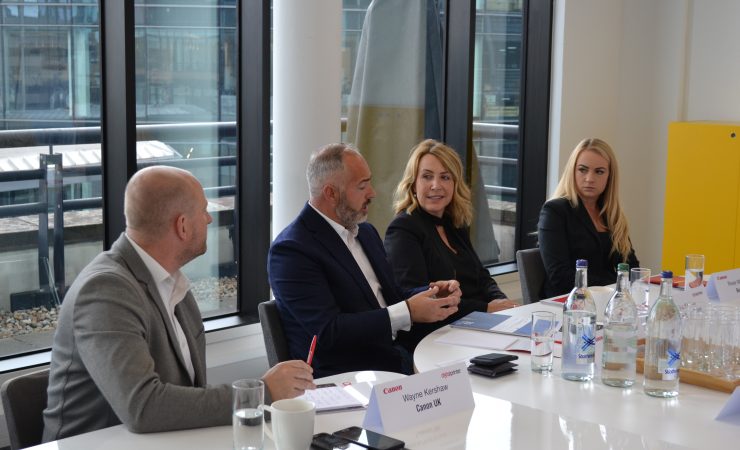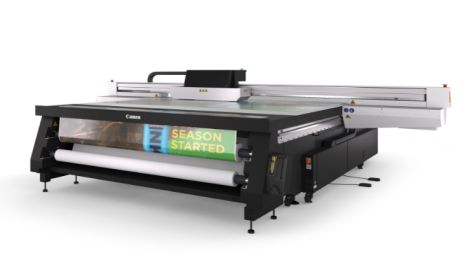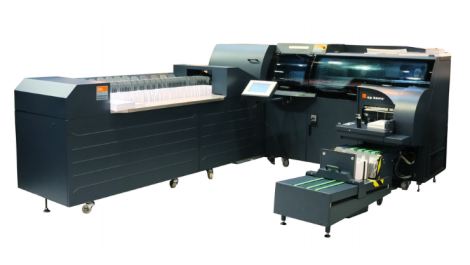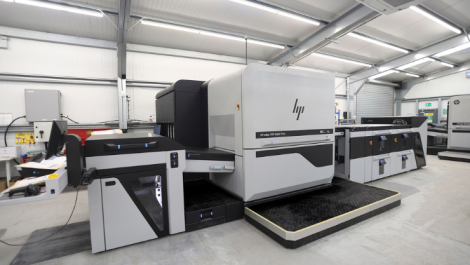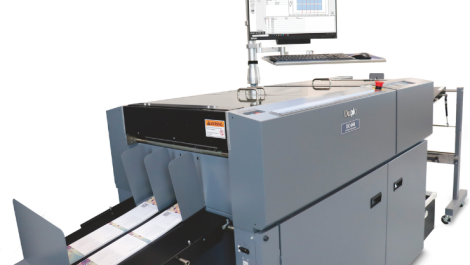A roundtable event sponsored by Canon and chaired by Digital Printer editor Michael Walker aimed to share experience and ideas for how to attract, retain and develop staff.
Finding, developing and keeping the right people is critical for any business. The challenge for print companies is made greater by the fact that the industry needs more fresh talent but isn’t seen by younger generations as a ‘cool’ or exciting one with a future. The roundtable discussion held at Canon’s London Customer Experience Centre ‘The View’ in June aimed to identify ways of overcoming these perceptions.
Attention please
The first topic to be tackled was the routes to reach potential candidates. While free recruitment websites like Indeed were popular, tactics varied according to company size, location and the local talent pool, covering everything from family and friends to social media and, for the larger businesses, in-house human resources (HR) staff.

The view from the View – the roundtable took place in the heart of London
The panel was generally negative about recruitment agencies, citing high fees and an emphasis on quantity over quality with candidate selection. Alan Rigglesford of City of London printer Kingswood iOptus gave as an example a prospective finishing operator who didn’t know what a perfect binder was, while Aron Priest, co-founder of Southend-based Solopress said that typically 15 CVs would be sent that had to be whittled down in-house.
However, the role of agencies in solving staffing for short-term peaks is definitely valuable, as Maz Keogh of Walthamstow-based Clifton Print Finishers confirmed; with 15 staff an absence or unexpected departure makes a big difference.
Where there is time for training, and a smaller local resource, then it’s given, though apprenticeships, once the only route into print, seem to be firmly out of fashion. Rosie Whitelock of Peterborough-based Bonacia said they had taken on a couple of apprentices but neither completed their apprenticeship.
‘We take anyone with basic maths skills and will train them; we haven’t a choice,’ she said, adding that it is difficult to recruit older and more experienced staff, though turnover is less at the more senior levels. Mr Priest concurred, saying, ‘The criteria have changed, we have to attract people, there’s not a great local pool’. He did also suggest that the trend towards similar interfaces on equipment such as Horizon’s finishing range meant that training could be faster and that younger staff didn’t necessarily need to learn the dimensions of standard sheet sizes by rote any more.
Ongoing consolidation in the industry is also a source of skilled people, whether gaining them through acquisition, as for Paul Manning at Rapidity which bought Lefa Print at the start of 2018, or needing to let some go as a result of it, which Mr Rigglesford said is happening at parent group Paragon, which continues to make acquisitions.
HR consultant Perry Timms, who was present to add some non print-specific expertise, suggested that an approach to recruitment advertising might be to ask for ‘help with our business’ rather than ‘come and operate a machine’.
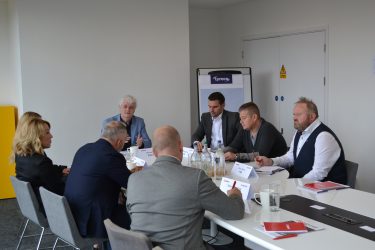
The roundtable was hosted by Digital Printer editor Michael Walker (head of the table)
Culture club
The discussion turned next to how to attract candidates once you have their attention. For Bonacia, it’s all about company ethos and management style. ‘We’re heavy on culture, and known as a good place to work,’ said Ms Whitelock, going on to expand about Bonacia’s ‘house’ system in which house points are awarded by senior management. The houses are split across all the company’s departments so the scheme allows staff who don’t know each other to compete together and according to Ms Whitelock, has been very successful at fostering a team spirit.
Employee recognition is important at Solopress too. Mr Priest explained that all staff receive birthday cards, Christmas hampers and Easter eggs (though Bonacia went one better with an Easter egg hunt), while there are also ‘employee of the month’ awards with cash prizes, charity and social events, plus a bi-annual staff magazine. Mr Priest also mentioned the idea of a well-being centre that could help staff with personal problems such as bereavement; this could also support mental health awareness.
Addressing the workspace can help, said Mr Manning, who explained that opening up offices so that people were all in the same room had helped, adding ‘the best thing was adding a staff room. When people couldn’t eat at their desks, it made a massive difference.’ He also commented that while the more socially-focused programmes of other panellists weren’t implemented at Rapidity, the more work-focused ability to diversify skills and earn good money through overtime are. Ms Keogh echoed that some of the ideas mentioned were difficult for small companies to put into effect, but that performance-related bonuses are always appreciated. Things like increasing paid holiday entitlement with length of service are also easy to implement.
Dealing with staff spread across multiple sites can be a challenge, as Mr Manning, whose central London-based firm acquired Sidcup’s Lefa Print last year has found, backed by Mr Priest who confirmed that ‘you might go three or four months without visiting a site, you have to make the extra effort.’
While it would be hoped that these things might be rewarded with loyalty, it seems that being open and honest with employees perhaps goes further. Mr Priest recounted an example of a firm where he had worked in the 1980s where management had asked employees to work unpaid for three months to get the business through a cashflow crisis, describing it as the ‘the best three months ever’.
The flip side of loyalty is arguably not those who leave to seek a better job elsewhere but those who stay for decades but don’t progress and develop a negative attitude. While Mr Priest described them as ‘poison’, Mr Manning commented ‘If it goes past a point of no return you have to look at performance management, so it’s better to call it a day. It’s astonishing the damage one person can do.’
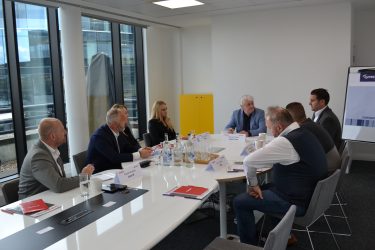
The panel debated the merits of recruitment agencies, consolidation, the workspace and more
HR or hardware?
The panel was divided on the benefits of having dedicated HR staff; it was seen as a given in the largest companies and as an unaffordable luxury in the smallest. However, the equipment that they use matters to production staff. For Mr Priest, the opportunity to be trained on a new Heidelberg press was seen as a career boost, while Mr Manning said that people had even left in order to work with a specific new digital press.
Mr Timms pointed out that being asked to use a clunky PC laptop when you have a shiny new Mac at home wasn’t seen as a benefit, though Mr Manning countered that an interviewee turning up with an old laptop or Blackberry phone ‘tells you something’, so it cuts both ways.
IT skills are seen as important, especially at higher levels. Ms Whitelock commented that ‘the IT guy knows more than anyone’ and that a ‘disaster document’ was being written to try and encapsulate that knowledge should the worst happen. Mr Manning agreed that IT proficiency was ‘a massive bonus’ especially as it was the company’s biggest expense.
The exchange of experience, views and practice during led to a lively roundtable session in which many of our panel gained new ideas that they planned to take away and test. We hope you will too.
